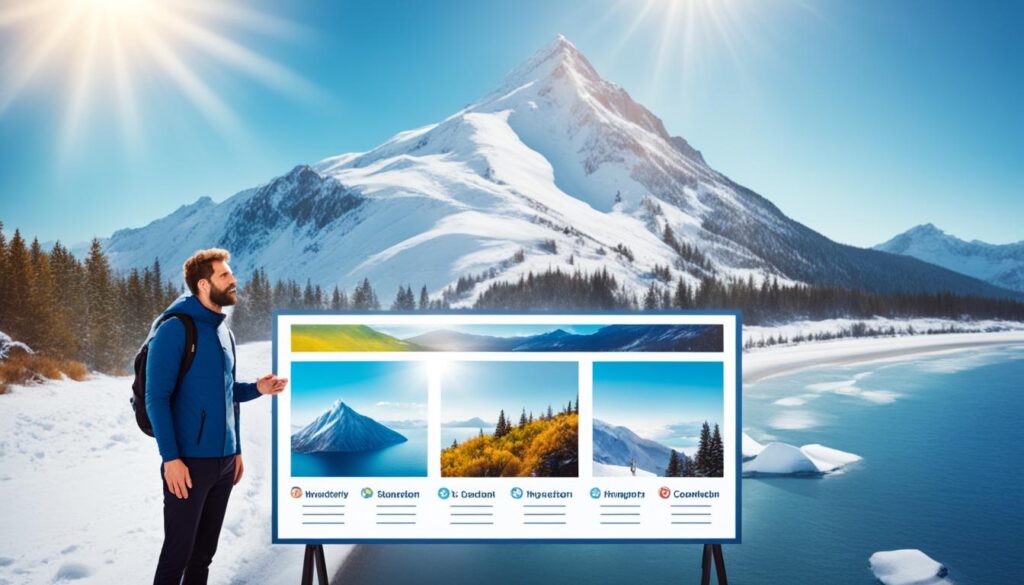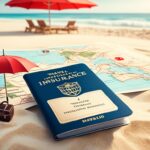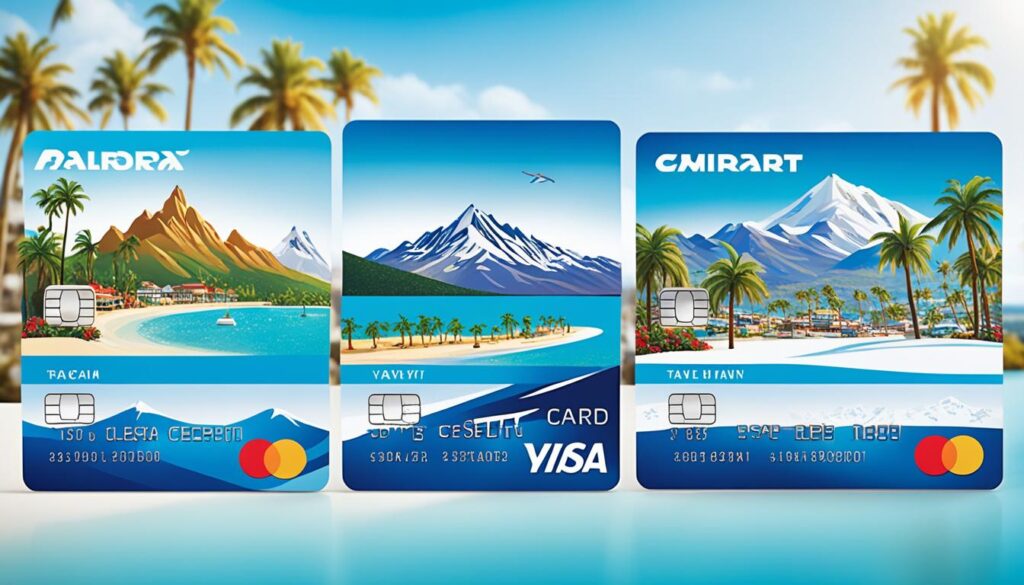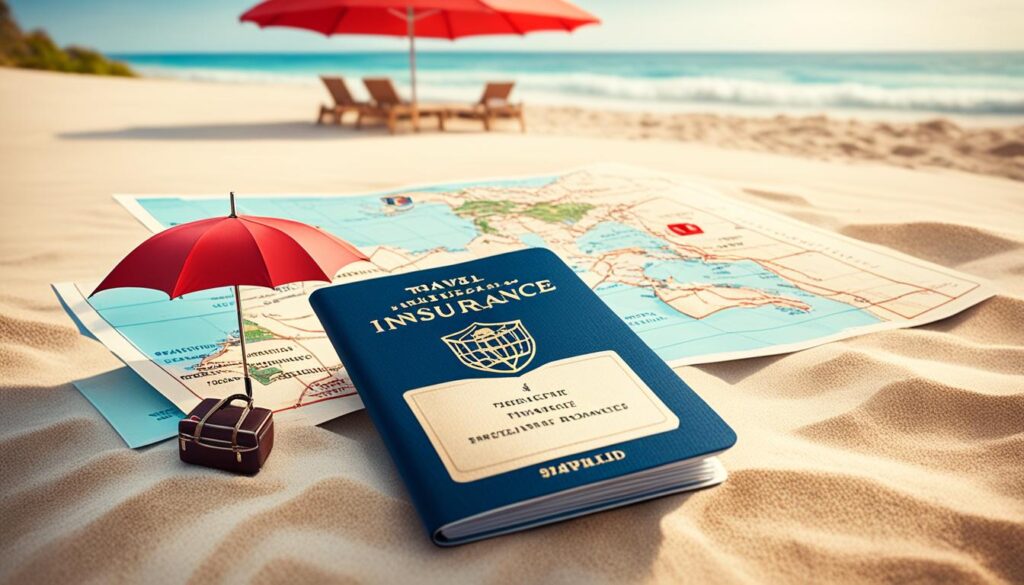“The world is a book, and those who do not travel read only a page.” – Saint Augustine
Planning a vacation can be overwhelming, but with the right strategies, it can be made easy and stress-free. In this ultimate guide, we will break down the step-by-step process of vacation planning, from determining your budget to selecting destinations and organizing your travel itinerary.
Key Takeaways:
- Take the time to plan your vacation to ensure a reliable and calm travel experience.
- Thorough planning enhances safety and increases the likelihood of a successful trip.
- Consider your available time and work/school schedule when determining the duration of your trip.
- Research the best time to visit your chosen destination based on weather conditions and cost.
- Choose a destination that aligns with your interests, budget, and desired travel experience.
The Importance of Vacation Planning
Planning your vacation ahead of time is crucial for several reasons. It ensures that your travel arrangements are reliable, allowing you to secure bookings and reservations in advance. By planning in advance, you can confidently choose the best flights, accommodations, and activities that align with your preferences and budget.
Thorough vacation planning also helps create a sense of calm. Knowing what to expect during your trip reduces stress and allows you to fully enjoy your time away. When you have a well-thought-out itinerary, you can focus on experiencing new adventures rather than worrying about the logistics.
Safety is another significant advantage of vacation planning. Properly researching and selecting accommodations and destinations ensures that you stay in safe and reputable places. It also provides insights into potential safety concerns or precautions you should be aware of. By preparing in advance, you can make informed decisions that prioritize your well-being.
A successful vacation is more likely when you have a detailed plan in place. Planning allows you to anticipate and mitigate potential issues before they arise. Whether it’s avoiding peak travel times, having contingency arrangements for unforeseen circumstances, or making necessary reservations, a well-planned vacation increases your chances of a smooth and enjoyable experience.
Budget-friendly travel is another significant benefit of vacation planning. By researching and comparing prices, you can find the best deals and discounts on accommodations, flights, and activities. Planning ahead also helps you allocate your budget effectively, ensuring that you can make the most of your vacation without overspending.
In conclusion, taking the time to plan your vacation thoroughly is essential for reliable, calm, safe, successful, and budget-friendly travel. It not only allows you to secure the best travel arrangements but also enhances your overall experience. So, start your vacation on the right foot by investing some time and effort into planning.
Determining Trip Duration
When planning your vacation, it’s essential to consider how long you can afford to be away. Factors such as your work or school schedule, available vacation time, and budget will determine the ideal duration for your trip. Take into account the travel time and the activities you want to experience during your vacation to ensure you have enough time to enjoy everything.
Factors Affecting Trip Duration
Several factors play a role in determining the duration of your trip. Here are the key considerations when deciding how long to make your vacation:
- Your work or school schedule: Check your calendar for any important commitments that may limit the duration of your trip. Consider any blackout dates or times when taking time off may be challenging.
- Available vacation time: Determine how many days or weeks of vacation you have accrued and can use for your trip. Take note of any limitations or restrictions set by your employer or school.
- Budget: Assess your financial resources and determine how much you can afford to spend on your vacation. Remember to factor in costs such as accommodation, transportation, meals, and activities.
It’s important to strike a balance between having enough time to relax and explore your destination while ensuring you stay within your budget. Consider the following tips to help you determine an appropriate trip duration:
- Research your destination: Investigate the attractions, landmarks, and activities available in your chosen location. Determine the must-see sights and estimate how much time you would need to fully experience them.
- Consider travel time: Account for the time it takes to reach your destination and return home. Factor in flight or drive durations, layovers, and potential delays.
- Allow for flexibility: It’s always beneficial to have some flexibility in your itinerary. Leave room for spontaneity, relaxation, and unexpected discoveries during your trip.
Example Trip Duration Options
To illustrate how trip durations can vary based on factors such as destination and available time, consider the following examples:
| Destination | Recommended Trip Duration |
|---|---|
| Paris, France | 7-10 days |
| Maui, Hawaii | 10-14 days |
| Bangkok, Thailand | 7-9 days |
| London, United Kingdom | 5-7 days |
| Machu Picchu, Peru | 4-5 days |
Keep in mind that these are general recommendations and can be adjusted based on your specific preferences and available time. The key is to plan a trip duration that allows you to make the most of your vacation experience and create lasting memories.
Deciding When to Travel

When planning your trip, one important aspect to consider is the timing of your travel. The season and weather conditions of your desired destination play a vital role in determining the best time to visit. To make the most of your vacation experience, it’s essential to understand the concept of peak season, off-season, and shoulder season, as it can greatly impact your budget and overall travel experience.
Peak Season
In the travel industry, peak season refers to the period when a destination experiences the highest number of visitors. This is typically the time of year when the weather is ideal, and the city or region is buzzing with activities and events. While peak season can offer an array of attractions and a vibrant atmosphere, there are a few things to consider:
- Crowds: Popular destinations during peak season can be crowded, making it harder to enjoy popular attractions and landmarks.
- Higher Prices: Accommodation, flights, and other travel-related expenses are generally more expensive during peak season.
- Advance Booking: To secure your preferred accommodations and activities, it’s advisable to make reservations well in advance.
Off-Season and Shoulder Season
On the other hand, off-season and shoulder seasons can be a more budget-friendly option for travelers. These periods occur when the number of visitors decreases, and the demand for travel-related services decreases. Here are some advantages of traveling during these seasons:
- Lower Prices: Accommodation, flights, and other travel expenses are often significantly cheaper during off-season and shoulder seasons.
- Less Crowded: With fewer tourists, you can enjoy attractions and landmarks with more space and fewer queues.
- Authentic Experience: Traveling during the quieter months allows you to experience the destination in a more authentic and relaxed way, interacting with locals and immersing yourself in the local culture.
While there may be some drawbacks during these seasons, such as limited opening hours for certain attractions or some establishments being closed for renovations, the advantages often outweigh the disadvantages.
It’s important to note that the peak, off, and shoulder seasons can vary depending on the destination. Research the specific location you plan to visit to determine the best time to travel based on your preferences and budget.
Consider the following factors when deciding on the timing of your trip:
- Weather: Determine what kind of climate you prefer and choose a time when the weather is most favorable for your desired activities.
- Budget: Assess your travel budget and determine if you are willing to spend more during peak season or prefer to save money by traveling during off-season or shoulder season.
- Events and Festivals: Research if there are any special events or festivals that you would like to attend, and plan your visit accordingly.
- Personal Preferences: Consider your personal preferences for crowd levels, weather conditions, and the overall atmosphere you seek during your vacation.
By carefully researching and choosing the timing of your trip, you can maximize your travel experience while staying within your budget. Take into account the various factors that influence your decision and select the time that suits you and your travel style best.
Selecting a Destination
Picking a travel destination can be challenging with so many options available. Start by considering your interests, budget, and the type of trip you want to experience. Whether you crave adventure, relaxation, or cultural immersion, finding the perfect destination is the key to an unforgettable journey.
To embark on the destination research process, gather travel inspiration from various sources:
- Friends and Family: Seek recommendations from those who have explored the world firsthand. They may have hidden travel gems and personal anecdotes to share.
- Travel Blogs: Dive into the virtual world of travel blogging, where experienced travelers and wanderlust seekers spill their secrets. Discover captivating stories and valuable insights that can shape your own itinerary.
- Social Media: Platforms like Pinterest and Instagram are treasure troves of stunning travel photos and insider tips. Follow travel influencers, explore destination-specific hashtags, and curate your own digital vision board filled with wanderlust-worthy images.
- Books: Old-fashioned yet timeless, travel books can transport you to distant lands. Allow yourself to get lost in the pages and discover new destinations through the words of seasoned travel writers.
As you conduct your research, keep an eye out for off-the-beaten-path destinations that offer unique experiences. These hidden gems can provide a refreshing break from popular tourist spots, allowing you to immerse yourself in local culture and discover hidden treasures.
Popular Destination Inspiration
“The world is a book, and those who do not travel read only a page.” – Saint Augustine
| Destination | Attractions | Key Highlights |
|---|---|---|
| Paris, France | Eiffel Tower, Louvre Museum, Notre-Dame Cathedral | Romantic ambiance, iconic architecture, world-class cuisine |
| Bali, Indonesia | Ubud Monkey Forest, Tanah Lot Temple, Mount Batur | Lush landscapes, vibrant culture, spiritual retreats |
| Cape Town, South Africa | Table Mountain, Robben Island, Cape of Good Hope | Breathtaking scenery, diverse wildlife, rich history |
| Tokyo, Japan | Tsukiji Fish Market, Meiji Shrine, Tokyo Disney Resort | Technological wonders, traditional customs, bustling city life |
Remember, selecting a destination is a personal choice that should align with your travel aspirations and desires. Take the time to explore various options, conduct thorough research, and follow your heart. With the perfect travel destination in mind, your journey will be filled with awe-inspiring moments and unforgettable adventures.
Booking Flights

When it comes to planning your vacation, booking flights is a crucial step. With numerous flight search engines available, it’s important to compare prices and options to find the best deals. Take advantage of discounts and promotions to save money on your airfare. Consider the following factors when choosing your flights:
- Flight duration: Look for flights that align with your travel preferences and schedule. Shorter flights may be more convenient, especially for shorter trips.
- Layovers: Take into account the number and duration of layovers. Longer layovers can provide a chance to explore a new city, but they can also lead to extended travel time.
- Baggage policies: Check the baggage allowance for each airline to ensure it aligns with your needs. Some airlines may charge additional fees for checked or overweight bags.
Once you’ve made your decision, make your flight reservations promptly to secure your seats. Popular flights and routes can fill up quickly, so it’s wise to act fast. Remember that flight prices can fluctuate, so booking early can also help you avoid sudden price increases. Take the time to carefully consider your options and make an informed decision that suits your travel preferences and budget.
“A journey of a thousand miles begins with a single flight reservation.” – Unknown
Finding Accommodation
When planning your vacation, finding the right accommodation is crucial for a comfortable and enjoyable stay. Whether you prefer hotels, vacation rentals, or guest houses, there are several factors to consider when making your decision.
Location: Begin by determining the ideal location for your stay. Consider proximity to tourist attractions, public transportation, and amenities such as restaurants and shops. Research the different neighborhoods in your destination to find the one that suits your preferences and provides convenience during your vacation.
Amenities: Think about the amenities that are important to you. Do you need a gym, swimming pool, or on-site restaurant? Are you traveling with pets and require a pet-friendly accommodation? Consider your specific needs and preferences to find a place that offers the amenities that will make your stay comfortable and enjoyable.
Reviews: Reading reviews from previous guests can provide valuable insights into the quality and service of an accommodation. Look for reviews on reputable travel websites or platforms to get an idea of what to expect. Pay attention to common themes among the reviews to get a better understanding of the property’s strengths and weaknesses.
Booking in Advance: To ensure availability and potentially secure better deals, it is advisable to book your accommodation in advance. Popular hotels and vacation rentals can fill up quickly, especially during peak travel seasons. By booking early, you can also take advantage of early bird discounts and special offers.
Pro Tip: Consider booking directly with the accommodation provider or utilizing reputable booking platforms that offer flexible cancellation policies. This way, you can have peace of mind knowing that you can modify or cancel your reservation if needed.
By taking the time to research and consider factors such as location, amenities, reviews, and booking in advance, you can find the perfect accommodation that meets your needs and enhances your vacation experience.
Transportation during Your Trip

When planning your vacation, it’s essential to consider the various transportation options available at your destination. Whether you’re exploring remote areas, bustling cities, or compact neighborhoods, choosing the right mode of transportation can greatly enhance your travel convenience. Here are some transportation options to consider:
Rental Cars
If you’re planning to venture into remote areas or prefer the flexibility of having your own vehicle, renting a car is a great option. With a rental car, you have the freedom to explore at your own pace and visit off-the-beaten-path destinations. It also provides convenience, especially if you have a lot of luggage or are traveling with a group.
Public Transportation
In urban areas, public transportation is often the most cost-effective and efficient way to get around. Cities usually have well-developed public transportation systems, including buses, trains, trams, and subways. Public transportation allows you to navigate the city easily, and it’s a great way to immerse yourself in the local culture.
Walking
Walking is a fantastic way to explore compact areas and tourist-friendly neighborhoods. It allows you to experience the destination up close, take in the sights at your own pace, and stumble upon hidden gems. Walking is also an environmentally friendly option that promotes a healthier lifestyle during your vacation.
| Transportation Option | Pros | Cons |
|---|---|---|
| Rental Cars | – Flexibility – Convenience – Off-the-beaten-path exploration |
– Additional costs (fuel, parking) – Traffic and navigation challenges |
| Public Transportation | – Cost-effective – Efficient in cities – Immersion in local culture |
– Limited routes and schedules – Crowded during peak hours |
| Walking | – Up-close exploration – Discovering hidden gems – Environmental friendliness |
– Limited range – Physical exertion |
When planning your itinerary, consider the activities you want to do and the places you want to visit. This will help you determine which transportation method is most suitable for each part of your trip. You may choose to rent a car for a day trip outside the city, rely on public transportation for in-city exploration, and use walking as your primary mode of transportation in pedestrian-friendly areas.
Remember to factor in the costs, convenience, and accessibility of each transportation option when making your decisions. By considering these factors and tailoring your transportation choices to your itinerary and preferences, you can maximize your travel convenience and make the most of your vacation.
Planning Activities
Once you have determined your destination and booked your flights and accommodation, it’s time to plan the activities for your vacation. This is the exciting part where you get to explore the sights, enjoy tours, and visit attractions that interest you. Here are some steps to help you with activity planning:
- Research: Start by researching the top sights and attractions in your destination. Use search engines, travel blogs, and tourism websites to gather information and recommendations. Take note of the must-visit places and activities that align with your interests.
- Consider Time Needed: Determine the duration each activity will take. Some attractions may require a few hours, while others might be a full-day experience. Take this into account when creating your itinerary to ensure you have enough time for each activity.
- Balance Your Schedule: Avoid overcrowding your schedule with back-to-back activities. Allow some buffer time between each activity to relax, explore the surroundings, or handle unexpected delays. Balancing your schedule will help you avoid feeling rushed and make your vacation more enjoyable.
- Look for Discounts: Check if there are any discounts or combination tickets available for the activities you want to do. Many attractions offer discounted rates for purchasing tickets online in advance or as part of a bundle.
Remember, activity planning allows you to make the most of your vacation and ensures you don’t miss out on any experiences. It’s important to strike a balance between planned activities and leaving room for flexibility and spontaneity.
Now let’s take a look at an example of how your activity planning can look:
| Day | Activity | Duration |
|---|---|---|
| Day 1 | City Sightseeing Tour | 3 hours |
| Day 1 | Visit Museum A | 2 hours |
| Day 2 | Hiking Trip to Mountain B | Full day |
| Day 3 | Explore Old Town | 4 hours |
| Day 3 | Dinner at Local Restaurant | 2 hours |
By planning activities in advance, you can make the most of your time and ensure you don’t miss out on any must-see sights or experiences. So grab your travel guide, research the attractions, and start creating your dream itinerary!
Exploring Local Cuisine
One of the highlights of any vacation is immersing yourself in the local food culture. Exploring local cuisine allows you to savor authentic flavors and have unique dining experiences. Whether you’re a foodie or simply love trying new dishes, researching restaurants and food options in your destination is essential.
To find the best places to eat, consider seeking recommendations from locals, travel blogs, or social media platforms. Locals often have insider knowledge and can point you to hidden gems that may not be on the usual tourist radar. Travel blogs and social media platforms like Instagram are great resources for finding popular dining spots and visually appealing dishes that will make your taste buds tingle.
“Food is our common ground, a universal experience.” – James Beard
When exploring local cuisine, don’t forget to budget for food expenses. Dining out can significantly contribute to your overall vacation expenditure, so it’s important to plan accordingly. Research average meal prices in your destination and allocate a realistic amount of money for dining experiences.
If you’re traveling to a popular food destination or during peak seasons, making reservations for popular eateries in advance is highly recommended. This ensures you won’t miss out on trying the most sought-after dishes and guarantees a spot at popular restaurants.
Restaurant Recommendations
Here are some restaurant recommendations in popular travel destinations known for their diverse and delicious local cuisine:
| Destination | Restaurant | Cuisine |
|---|---|---|
| Mexico City, Mexico | Pujol | Modern Mexican |
| Tokyo, Japan | Sukiyabashi Jiro | Sushi |
| Marrakech, Morocco | Le Jardin | Moroccan |
| Rome, Italy | La Pergola | Italian |
| Bangkok, Thailand | Err | Thai |
These are just a few examples, but there are countless incredible restaurants to discover in each destination. Don’t be afraid to venture off the beaten path and try local street food as well. Some of the best culinary experiences can be found in humble food stalls and bustling markets.
Remember, exploring local cuisine is not only about satisfying your taste buds, but it’s also a way to connect with the culture and traditions of the place you’re visiting. So, indulge in the flavors, embrace new culinary adventures, and make your dining experiences a memorable part of your vacation.
Additional Travel Planning Considerations
While planning your vacation, there are a few more things to keep in mind to ensure a smooth and stress-free trip. Take a look at these additional travel planning considerations:
1. Travel Insurance
Don’t forget to prioritize your safety and protect yourself against unexpected events by purchasing travel insurance. It provides coverage for medical emergencies, trip cancellations, lost baggage, and more, giving you peace of mind throughout your journey.
2. City Passes
If you’re planning to visit multiple attractions in a city, consider purchasing city passes. These passes often offer discounted entry fees, fast-track access, and exclusive deals for popular tourist sites and activities. They can help you save money and make the most of your time in the city.
3. Travel Organization
Stay organized throughout your trip planning process. Create a dedicated folder or digital document to keep all your important travel documents in one place, including flight details, accommodation reservations, and contact information. This will make it easier for you to access essential information quickly.
4. Travel Essentials
Make a checklist of essential items to pack for your vacation. This includes clothing appropriate for the destination and season, toiletries, medications, travel adapters, and any specific items you may need for your activities or destination. Having a well-prepared packing list will ensure you don’t overlook any essentials during your trip.
5. Vacation Budgeting
Allocate a budget for your vacation and track your expenses throughout the planning process. Be mindful of costs such as accommodation, transportation, meals, activities, and souvenirs. Research and compare prices to find the best deals and maximize your vacation budget.
By considering these additional travel planning considerations, you can make sure that your vacation is not only well-organized but also enjoyable and stress-free.
Conclusion
Planning a vacation doesn’t have to be overwhelming. By following these step-by-step guidelines, you can easily organize and customize your vacation according to your preferences and budget. With careful planning, you can create memorable travel experiences and make the most of your time away. So start researching destinations, setting a budget, and creating a travel itinerary that suits your interests and desires.
Remember to determine the ideal trip duration, consider the timing of your travel, and select a destination that aligns with your interests. When booking flights and accommodation, compare options and make reservations in advance to secure the best deals. Plan your transportation method and activities ahead of time to ensure a smooth and enjoyable vacation.
Once you’ve taken care of the logistical details, don’t forget to indulge in the local cuisine and explore new flavors. Consider additional travel planning considerations such as travel insurance, city passes, and organizing your travel essentials. With these tips in mind, you’re well on your way to creating unforgettable travel memories and having an incredible vacation. Happy travels!
FAQ
Why is vacation planning important?
Vacation planning is important because it helps ensure reliable travel arrangements, creates a sense of calm during your trip, enhances safety, increases the chances of a successful vacation, and helps you stay within your budget.
How do I determine the duration of my trip?
Consider factors such as your work or school schedule, available vacation time, and budget when determining the ideal duration for your trip. Take into account travel time and the activities you want to experience to ensure you have enough time to enjoy everything.
How do I decide when to travel?
When deciding when to travel, consider the season and weather conditions of your desired destination. Peak seasons offer more activities but can be crowded and expensive. Off-season and shoulder seasons are often more budget-friendly. Research the best time to visit based on your preferences and budget.
How do I select a travel destination?
Start by considering your interests, budget, and the type of trip you want to experience. Seek inspiration from friends, family, travel blogs, and social media platforms. Take note of off-the-beaten-path destinations for a unique experience.
How do I book flights?
Compare prices and options from different flight search engines. Look for deals and discounts to save money. Consider factors such as layovers, flight duration, and baggage policies when choosing your flights. Make your flight reservations promptly to secure your seats.
How do I find accommodation?
Research various accommodation options such as hotels, vacation rentals, and guest houses. Consider factors such as location, amenities, and reviews when making a decision. Book your accommodation in advance to ensure availability and potentially secure better deals.
What are the transportation options during my trip?
Depending on your destination, consider options such as renting a car for flexibility, using public transportation for cost-effectiveness, and walking for exploring compact areas. Plan your transportation method based on your itinerary and preferences.
How do I plan activities for my trip?
Research and plan activities using search engines, travel blogs, and tourism websites. Look for discounts or combination tickets to save money. Consider the time needed for each activity and balance your schedule for a more enjoyable experience.
How do I explore local cuisine during my vacation?
Research restaurants and food options in your destination to savor authentic flavors. Seek recommendations from locals, travel blogs, or social media platforms. Don’t forget to budget for food expenses and make reservations for popular eateries if necessary.
What other considerations should I keep in mind while planning my vacation?
Consider purchasing travel insurance for peace of mind, exploring city passes for discounts and access to attractions, staying organized throughout the planning process, keeping track of your bookings, and making a list of essential items to pack for a hassle-free trip.
Do you have any final tips for vacation planning?
Planning a vacation doesn’t have to be overwhelming. By following these step-by-step guidelines, you can easily organize and customize your vacation according to your preferences and budget. With careful planning, you can create memorable travel experiences and make the most of your time away. Happy travels!
















